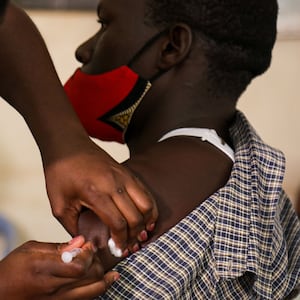The discovery of a mega-mutated strain of COVID in a handful of countries has triggered a global freakout—from a plunge in stock prices to the U.S. banning flights from some African nations.
The reaction comes as scientists are rushing to determine how transmissible the strain is, whether it’s more likely to evade the vaccine, and whether it causes more severe illness than other versions.
The World Health Organization said Friday it appears to carry an “increased risk of reinfection” and assigned the virus a Greek letter, Omicron.
“This variant has a large number of mutations, and some of these mutations have some worrying characteristics,” said Maria Van Kerkhove of WHO.
At the moment, the number of documented cases of B.1.1.529 is small—around 100—but health officials fear it may be fueling a dramatic surge in new cases in South Africa. The country—where less than half of all adults are vaccinated—went from about 200 new cases a day to 10 times that on Thursday.
So far, the variant has been identified in five places: South Africa; Botswana; Hong Kong, where a visitor from South Africa tested positive while in quarantine, as did someone in a hotel room across from them; Belgium, in an an unvaccinated young adult woman who had been traveling in Egypt and Turkey, but had not been to southern Africa; and Israel, where someone who had traveled to Malawi tested positive.
A cascade of countries, including the U.S., United Kingdom, France, Italy, the Netherlands, Austria, Ireland, the Philippines, and Israel, reacted to the news of the strain by suspending flights from South Africa and some other African nations until scientists know more about how quickly it spreads and how effective the current vaccines are at preventing infection.
“Early indications show this variant may be more transmissible than the Delta variant and current vaccines may be less effective against it,” British Health Secretary Sajid Javid said in announcing the U.K. ban. “We must move quickly and at the earliest possible moment.”
News of the Omicron variant rattled the markets, with the Dow dropping 900 points on Friday morning, the worst showing of the year. Travel-related stocks were especially hard hit.
The discovery of a variant is not catastrophic in and of itself, but scientists say this one has more than 30 mutations to the spike protein, which is what binds the virus to human cells.
South African health authorities said some of the mutations are already tied to increased contagiousness and antibody resistance—and some of the infections in Botswana were found in people who had been vaccinated.
More work must be done to determine if Omicron is something akin to the Delta variant, which fueled the last devastating surge, or more like other variants that have not brought a sustained, widespread increase in cases.
“This is clearly a variant that we must be very serious about,” Ravindra Gupta, professor of clinical microbiology at the University of Cambridge, told the Associated Press.
But he added that it’s fortunate the variant is already on the global radar.
“South African scientists have done an incredible job of identifying this quickly and bringing it to the world’s attention,” he said.







